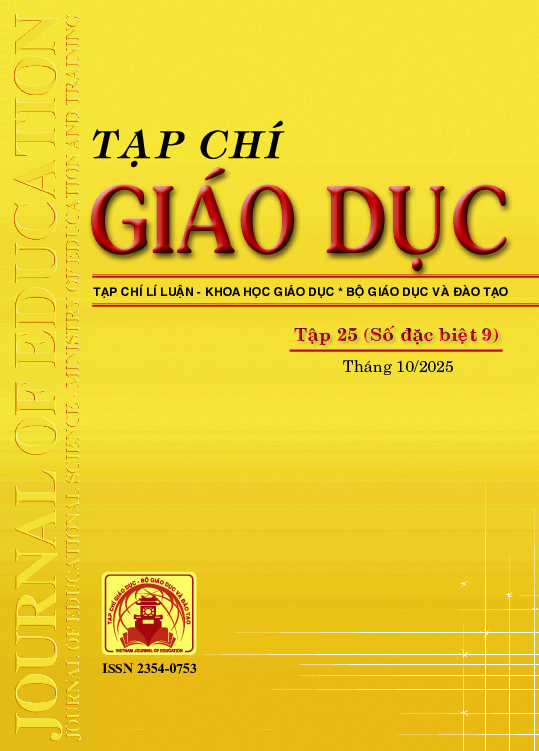Dạy học chủ đề “Sinh vật và môi trường” (Khoa học tự nhiên 8) thông qua vấn đề thực tiễn nhằm phát triển năng lực giải quyết vấn đề cho học sinh
Tóm tắt
According to the 2018 General Education Curriculum, problem-solving competence is identified as one of the core competencies that must be fostered through teaching and learning. Teaching based on real-world problems not only enables students to acquire knowledge but also helps them develop analytical skills, creativity, collaboration, critical thinking, and problemsolving competence. This article focuses on applying real-world problembased teaching to develop students’ problem-solving competence in the topic Organisms and the Environment within Grade 8 Natural Sciences. Based on theoretical and practical analysis, the study proposes a three-phase teaching process: (1) Designing lesson plans through real-world problems; (2) Organizing instruction through real-world problems to develop problemsolving competence; (3) Evaluation and improvement. Employing three main research methods (theoretical study, expert consultation, and statistical analysis), the article affirms the feasibility and significance of applying realworld problem-based teaching in Natural Sciences. It also suggests an approach to enhance teaching quality and meet the requirements of competency development for students in the current educational context.
Tài liệu tham khảo
Bộ GD-ĐT (2018). Chương trình giáo dục phổ thông - Chương trình tổng thể (ban hành kèm theo Thông tư số 32/2018/TT-BGDĐT ngày 26/12/2018 của Bộ trưởng Bộ GD-ĐT).
Đặng Thị Tuyến, Nguyễn Thùy Dung, Nguyễn Thị Hằng Nga, Nguyễn Lân Hùng Sơn (2023). Xây dựng và sử dụng bộ học liệu gắn với khu du lịch quốc gia chùa Tam Chúc, tỉnh Hà Nam để tổ chức dạy học chủ đề “Sinh thái học phục hồi, bảo tồn và phát triển bền vững” (Sinh học 12). Tạp chí Giáo dục, 23(số đặc biệt 10), 67-74.
Dare, E. A. (2021). The role of STEM disciplines, real-world problems, 21st century skills. ERIC.
Đoàn Kim Ngọc, Nguyễn Thị Hồng Nam (2024). Phát triển năng lực giải quyết vấn đề và sáng tạo cho học sinh lớp 11 qua hoạt động trải nghiệm trong môn Ngữ văn. Tạp chí Khoa học, Trường Đại học Cần Thơ, 60(1C), 179-189.
English, L. D., & King, D. (2015). STEM learning through engineering design: Fourth-grade students’ investigations in aerospace. International Journal of STEM Education, 2(14), 1-18. https://doi.org/10.1186/s40594-015-0027-7
Future Problem Solving Program International. (2025). The problem solving process. FPSPI. Retrieved from https://fpspi.org/problem-solving-method/
Han, S., & Kim, H. M. (2020). Components of mathematical problem solving competence and mediation effects of instructional strategies for mathematical modeling. Education and Science, 45(202), 93-111. https://doi.org/10.15390/EB.2020.7386
Hmelo-Silver, C. E. (2004). Problem-based learning: What and how do students learn? Educational Psychology Review, 16(3), 235-266. https://doi.org/10.1023/B:EDPR.0000034022.16470.f3
Jonassen, D. H. (2000). Toward a design theory of problem solving. Educational Technology Research and Development, 48(4), 63-85. https://doi.org/10.1007/BF02300500
Kelley, T. R., & Knowles, J. G. (2016). A conceptual framework for integrated STEM education. International Journal of STEM Education, 3(11), 1-11. https://doi.org/10.1186/s40594-016-0046-z
Mehadi, R. (2019). 21st Century Skill “Problem Solving”: Defining the Concept. Asian Journal of Interdisciplinary Research, 2(1), 64-74. http://doi.org/10.34256/ajir1917
Miller, K., Miller, O., & Lawrence, G. (2025). Teaching problem solving in undergraduate physics courses: An endorsement for deliberate practice. arXiv preprint. https://doi.org/10.48550/arXiv.2508.08133
Mourtos, N. J., Okamoto, N. D., & Rhee, J. (2004). Defining, teaching, and assessing problem solving skills. In 7th UICEE Annual Conference on Engineering Education (Vol. 1).
Nguyễn Ngọc Mưu, Nguyễn Thị Hằng Nga, Lê Đình Trung (2025). Phát triển năng lực nghiên cứu khoa học cho học sinh trong dạy học Sinh học 11 thông qua dự án STEM. Tạp chí Giáo dục, 25(14), 42-47.
OECD (2019). PISA 2018 assessment and analytical framework. Paris: OECD Publishing. https://doi.org/10.1787/b25efab8-en
Paucar-Curasma, R., Mercado Rivas, R. Y., & García Mendoza, P. J. (2025). Promoting sustainable research competence through a problem-solving method and a STEM educational kit: A case study with nursing students at a newly established public university in Peru. Sustainability, 17(16), 7381. https://doi.org/10.3390/su17167381
Phillips, J. A., Clemmer, K. W., McCallum, J. E., & Zachariah, T. M. (2017). A problem-solving framework to assist students and teachers in STEM courses. Journal of College Science Teaching, 46(4), 33-39. https://doi.org/10.2505/4/jcst17_046_04_33
Price, A. M., Kim, C. J., Burkholder, E. W., Fritz, A. V., & Wieman, C. E. (2021). A detailed characterization of the expert problem-solving process in science and engineering: Guidance for teaching and assessment. CBE-Life Sciences Education, 20(3), ar43. https://doi.org/10.1187/cbe.20-12-0276
Rahmawati, S., Prastyo, D., & Nugraha, Y. (2024). Project-based problem learning: Improving problem-solving skills in higher education engineering students. International Journal of Instruction, 17(1), 45-62.
Savery, J. R. (2015). Overview of problem-based learning: Definitions and distinctions. In A. Walker, H. Leary, C. Hmelo-Silver, & P. A. Ertmer (Eds.), Essential readings in problem-based learning (pp. 5-15). West Lafayette, IN: Purdue University Press.
Schoenherr, J. (2024). Personalizing real‐world problems: Posing own problems increases self‐efficacy expectations, intrinsic value, attainment value, and utility value. British Journal of Educational Psychology, 94(2), 407-424.
Trần Trung Ninh, Vũ Phương Liên (2018). Năng lực hợp tác giải quyết vấn đề của học sinh phổ thông trong dạy học Hóa học. Tạp chí Khoa học Giáo dục Việt Nam, 02, 40-49.
Zhang, C., Wang, P., Zeng, X., & Wang, X. (2025). A case study on developing students' problem-solving skills through interdisciplinary thematic learning. Frontiers in Psychology, 16, 1447089. https://doi.org/10.3389/fpsyg.2025.1447089
Zhang, Y. (2025). Interdisciplinary learning model and the cultivation of students’ problem-solving competence: A three-dimensional support approach. Frontiers in Psychology, 16, 1447089. https://doi.org/10.3389/fpsyg.2025.1447089
Đã Xuất bản
Cách trích dẫn
Số
Chuyên mục
Giấy phép

Tác phẩm này được cấp phép theo Ghi nhận tác giả của Creative Commons Giấy phép quốc tế 4.0 .












